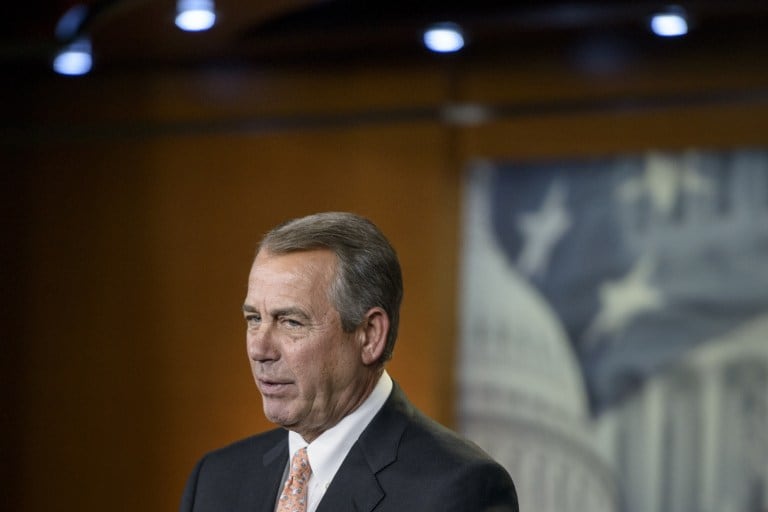WASHINGTON — Iran could have the capabilities to build a nuclear bomb almost immediately after the first 13 years of the emerging nuclear deal, President Barack Obama acknowledged on Tuesday. House Speaker John Boehner reacted tersely, arguing that Obama had just confirmed what critics of the deal have long feared.
Under the framework for a final deal, Iran would be kept at least a year away from a bomb for the first decade, Obama said, as he pressed ahead in his campaign to sell the deal to skeptics. Pushing back on criticism that the deal allows Iran to keep enriching uranium, Obama told NPR News that enrichment isn't the prime concern because Iran will be capped for a decade at 300 kilograms — not enough to convert to a stockpile of weapons-grade material.
"What is a more relevant fear would be that in Year 13, 14, 15, they have advanced centrifuges that enrich uranium fairly rapidly, and at that point, the breakout times would have shrunk almost down to zero," Obama said.
Breakout time refers to how long it would take to build a bomb if Iran decided to pursue one full-bore — in other words, how long the rest of the world would have to stop it. The framework deal expands Iran's breakout time — currently two to three months — to at least a year.
Yet that constraint would stay in place only for 10 years, at which point some restrictions would start phasing out. Boehner, R-Ohio, said Tehran was taking the long view and cautioned that the Iranian regime could exploit the easing of restrictions to fulfill its ambitions of exporting revolution across the globe.

Speaker of the House John Boehner speaks during a Feb. 26 press conference on Capitol Hill.
Photo Credit: Brendan Smialowski/AFP
"It is clear that this 'deal' is a direct threat to peace and security of the region and the world," Boehner said. Considering Iran's history of evading international inspections, he added, "no one should believe that the proposed inspection and verification are bullet-proof."
The tough talk from Boehner suggested congressional leaders were continuing to sour on the framework deal that Obama and world leaders reached with Iran last week in Switzerland. Previously, Boehner had expressed serious concerns about the deal's parameters, but withheld full judgment until lawmakers had time to digest all the details.
Other top lawmakers, including some members of Obama's party, have been pressing for Congress to hold a vote on whether to approve the deal — a prospect Obama has rejected outright. Senate Foreign Relations Chairman Bob Corker, R-Tenn., is pushing legislation that would also prevent Obama from using his own authority to temporarily waive existing U.S. sanctions while Congress debates the deal.
Although Obama acknowledged in the interview that Iran's breakout time could shrink after 13 or 14 years, he said at least the world would have better insight into Iran's capabilities because of extensive inspections in the earlier years.
"The option of a future president to take action if in fact they try to obtain a nuclear weapon is undiminished," Obama said.
The stark admission came as the president seeks to quiet a growing chorus questioning whether the deal he and world leaders have negotiated merely delays the certainty of a nuclear-armed Iran. Obama has insisted confidently that Iran will not get a nuclear weapon on his watch, which ends in roughly 20 months, but has made no similar assurances about his successors.
Tehran has always maintained it doesn't want a nuclear bomb, but the international community has been skeptical, and America's close ally Israel considers a nuclear Iran an existential threat. U.S. lawmakers and foreign policy hawks have questioned how Obama can strike a diplomatic deal with a country that continues to threaten Israel and tops the U.S. list of state sponsors of terror.
Obama, who is also working to restore ties to longtime U.S. foe Cuba, has suggested cautiously in the past that a nuclear agreement could be a precursor to Iran pursuing a more amicable relationship with the world community. But in the days since the framework deal was announced in Switzerland, his administration has sought to emphasize that the deal relies on inspections, not trust, and is worthwhile even if the Iranian regime remains venomously anti-American.
"I think there are hard-liners inside of Iran that think it is the right thing to do to oppose us, to seek to destroy Israel, to cause havoc in places like Syria or Yemen or Lebanon," Obama said. "If they don't change at all, we're still better off having the deal."
